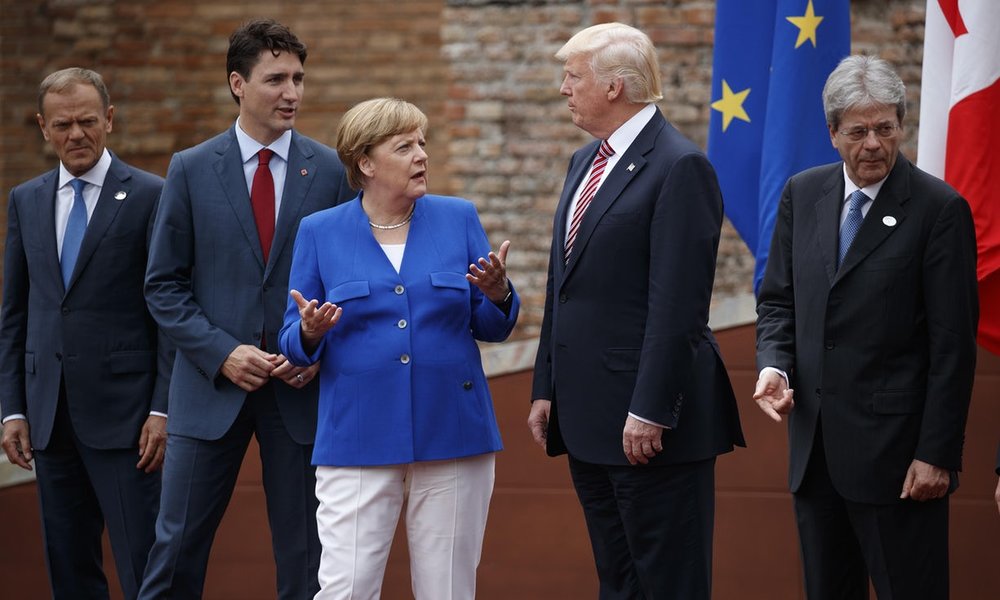Three-quarters of world has little or no confidence in Trump, Pew study finds

Israel and Russia have faith in Trump – not so European allies
More than three-quarters of the world has little or no confidence in Donald Trump’s global leadership and his signature policies, with support for the American presidency collapsing fastest among America’s traditional allies in Europe, according to new polling by the Pew Research Center.
In many countries, support for the U.S. president is now below that of George Bush in 2004, following the Iraq invasion. Globally, two-thirds of respondents describe Trump as “arrogant and dangerous”.
The research conducted across 37 countries shows a median of 22% have some or a great deal of confidence in Trump to do the right thing when it comes to international affairs. Almost three-quarters (74%) have little to no confidence in the Republican leader.
By contrast, in the final years of Barack Obama’s presidency, a median of 64% expressed confidence in Trump’s predecessor to direct America’s role in the world.
The low level of support
The polling also shows that the low level of support for the president is leading to a decline in support for wider American values. Just 49 % expressed a broadly positive view of the U.S., compared with 64% in surveys carried out 2015 and 2016.
For the first time in Pew research history, most Canadians no longer regard America as a force for good in the world.
Just 43% of Canadians have a positive view of their neighbor.
The two major countries expressing faith in Trump’s ability to be a force for good are Israel and Russia.
The U.S. president has persistently low ratings across Latin America and Europe, where medians of only 14% and 18% respectively have confidence in his leadership. Only 5% in Mexico and 7% in Spain have confidence in Trump.
The survey also finds that Trump is personally disliked globally, with most seeing him as arrogant, intolerant and dangerous, while few think of him as well-qualified or as someone who cares about ordinary people.
Trump’s supporters will argue his “America First” policies were never intended to make him popular globally, and some of his domestic approval ratings have shown a small increase. But such high levels of unpopularity are likely to make other world leaders believe there is no electoral downside in airing their differences with him – or with the U.S.
Support for U.S. president now below that of George Bush following Iraq invasion.
The poll suggests that Angela Merkel has replaced the American president as the politician to whom the world’s people look for leadership.
Forty-two per cent expressed confidence in the German chancellor, while 31% said they did not have confidence in her. A median of 60% in Europe have confidence in her, a rare achievement for someone who has been at the helm of Germany for more than a decade. Her support is especially strong on the centre-left, underlining how difficult it has become for the opposition German Social Democratic Party to land a blow upon her in the German election campaign.
In contrast, just 6% of Germans said they believed Trump was qualified to be president; 13% believe he cares about ordinary people; and 91% regard him as arrogant, 81% as intolerant, and 76% as dangerous.
In the UK, 89% see him as arrogant, 77% as intolerant and 69% as dangerous. Globally, 65% think Trump is intolerant and 62% that he is dangerous.
Unpopular policies
Most of his trademark policies are also unpopular, including his proposed wall on the Mexican border, his withdrawal from the Paris climate change treaty and his ban on immigrants from several mainly Muslim countries.
In Germany, hosts to the G20 summit of world leaders next month, only 9% support Trump’s decision to pull out of the Paris climate change treaty. Globally, only 19% support the move.
In just four of 10 EU countries surveyed does the public feel positively inclined toward the U.S. as a country. The most widespread support is found in Poland (73%), Hungary (63%) and Italy (61%). In spite of the “special relationship” between the U.S. and the UK, only 50% of the British see the U.S. favorably.
The most negative views of the U.S. are in Germany (62% unfavorable), Spain (60%) and the Netherlands (59%). And in the past year, the share of the Spanish public that expresses a very unfavorable opinion has roughly tripled from 7% to 23%.
In more than half of the 37 countries surveyed, positive views of the U.S. experienced double-digit drops in 2017.
In Mexico, positive views of the U.S. have roughly halved, down 36 points from 66% to 30%.
(Source: The Guardian)
